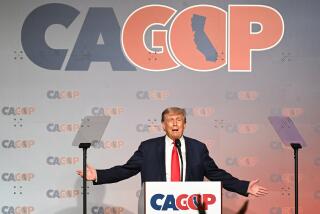Few Remember Cornelius Cole but the Name Lives On
- Share via
For anyone who thinks California Sens. Barbara Boxer and Dianne Feinstein will be remembered for their votes in the impeachment trial of President Clinton, consider Cornelius Cole.
Cole was one of the Republican senators from California who called out “guilty” during the roll call at the 1868 impeachment trial of President Andrew Johnson.
For the record:
12:00 a.m. Feb. 11, 1999 For the Record
Los Angeles Times Thursday February 11, 1999 Home Edition Part A Page 3 Metro Desk 1 inches; 30 words Type of Material: Correction
Secretary of War--Due to an editing error, a story in Wednesday’s editions on former California Sen. Cornelius Cole misidentified the Secretary of War fired by President Andrew Johnson. It was Edwin M. Stanton.
Does anybody remember him?
Not visitors to the Hollywood Forever Cemetery, where Cole, who died at the age of 102, is interred with Cecil B. DeMille and Rudolph Valentino.
Not the residents of Cole Avenue, named after the senator who settled in Hollywood after leaving public office.
And not The Times, whose lengthy 1924 obituary on the death of the “Southland’s Grand Old Man” made no mention of Cole’s participation in the historic trial.
In “Memoirs of Cornelius Cole,” published in 1908, Cole devotes just six pages of the book’s 354 pages to the trial.
“I voted with the majority to sustain the accusations,” Cole wrote. “I so decided with no pleasure and have since been glad the trial turned out as it did.”
Perhaps if he had bolted like seven other Republicans or cast the deciding vote to acquit Johnson, as did Sen. Edmund G. Ross of Kansas, Cole might be better remembered.
In the current context, however, it might also be worth noting that Ross and his Republican recusants were never reelected to the Senate.
Unlike his Southern California contemporaries, such as Henry Hancock and John G. Downey, who also are remembered in community names, mentions of Cole draw a “Who?” even among local history buffs.
But his life was remarkable enough that the Los Angeles Evening Express wrote in an editorial in 1928 that a monument to the former senator be placed alongside those of Father Junipero Serra and Thomas Starr King in the U.S. Capitol’s Statuary Hall.
The bearded Cole was a lawyer, founder of the California Republican Party and an antislavery congressman who attended Lincoln’s Gettysburg Address. He came to California from New York during the Gold Rush and served as Sacramento district attorney before his election to the House--one of only three House members from California.
After his election, he complained that he had to sell his stock in the Central Pacific Railroad because he would be voting on legislation affecting the railroads.
“Those shares of the original stock became eventually . . . , largely through my exertions in Congress, worth several millions,” he wrote. “Such is the sacrifice of a man in public life . . . but for which he gets no credit.”
In 1866, Cole was appointed to the U.S. Senate by the Legislature.
That same year, he took his first trip to Los Angeles, visiting Gen. Phineas Banning in Wilmington.
“In 1866, the pueblo of the Queen of the Angels had but barely begun to assume the aspect of an American city,” he wrote in his autobiography. “Adobe residences were common and zanjas, or water ditches, were encountered in various directions.”
Little was written about how Californians reacted to the Johnson impeachment trial.
“California was still very remote,” said historian Andrew Rolle. “It had only been a state for 18 years.”
Perhaps Los Angeles’ 5,000 residents were still preoccupied with the former mayor who recently had hanged himself in the council chamber because of a scandal.
Writing about the impeachment trial, Cole recalled that the “feeling of cordiality” between him and his old friend William H. Seward, for whom Cole once worked as a law clerk, “was seriously jarred” by his vote.
“I never said as much to Seward, but I believe the impeachment proceedings against Johnson were ill-advised but . . . had to be carried through,” Cole wrote. “It was a case of taking the wolf by the ears.”
John Conness, California’s other Republican senator, who also voted to remove Johnson from office, worked as a miner and merchant in California’s gold country. He served in the Senate from 1863 to 1869 and then retired to Massachusetts.
Cole wrote that “the most difficult problem that ever came before an American Congress was that relating to the reconstruction of the seceded states.”
Johnson was impeached for firing Seward, the secretary of War, without congressional consent. But the Radical Republican majority also was upset with the president for pursuing a more tolerant Reconstruction program.
“It was a common belief with members of Congress that the impeachment, though unsuccessful in removing the president from his exalted place, was not altogether ineffectual for good, since it resulted in a cessation of Johnson’s assaults on Congress and forestalled any further attempt to evade the Tenure of Office Law,” Cole wrote.
Cole was ousted from his Senate seat in 1872. But his impeachment vote was not a factor. He blamed the “powerful railroad interest,” citing his opposition to transferring Goat Island in San Francisco Bay to the railroad for a terminal.
In 1881, Cole moved to a 500-acre ranch bounded by what is now Gower, Seward, Rosewood and Sunset, receiving the land from Hancock as payment for legal services. The area was namedColegrove after Cole’s wife, the former Olive Colegrove.
Though Cole’s personal history is all but forgotten, his name and career retain their local memorials. Cole Avenue is well known to thousands of Hollywood and Mid-Wilshire residents as the site of the local office of the Department of Motor Vehicles. And the next time you drive down Hollywood’s internationally renowned Vine Street, think of Sen. Cole. The street carries its name because it ran through his vineyard.
More to Read
Get the L.A. Times Politics newsletter
Deeply reported insights into legislation, politics and policy from Sacramento, Washington and beyond. In your inbox twice per week.
You may occasionally receive promotional content from the Los Angeles Times.











